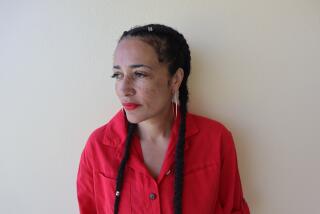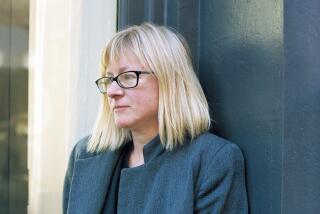Soon, no room for the muse
Acclaimed author Luis J. Rodriguez and his wife, Maria, had a dream of bringing art and culture to a community long ignored by theaters and bookstores. So they took out a second mortgage on their San Fernando home and began renting what was once office space in a small strip mall.
Thus was born Tia Chucha’s Centro Cultural in Sylmar. To most people, it’s simply Tia Chucha’s, which for the last five years has been a popular gathering place where people can sip lattes and eat tamales while reading about Chicano history or listening to local musicians and poets perform during weekly open-mike nights. On any given night, a guitarist might blend Mexican folk with hard rock, with the poets mixing English with Spanish slang as they recite.
“This place is a temple that is open seven days a week,” said Maria Morales, 50, who discovered a passion for creative writing that’s been nurtured at the center.
But the thriving art space will soon be closed.
The owner of the Glenoaks Boulevard strip mall housing Tia Chucha’s has given Rodriguez until the end of February to move out so a high-tech laundromat can be built on the property.
“We can’t compete with that kind of business,” said Rodriguez, the author of 10 books who is internationally known for his 1993 memoir of gang life, “Always Running: La Vida Loca, Gang Days in L.A.”
Rodriguez and his supporters are scrambling to find a temporary location where they can operate the bookstore and performance space. Once they find a permanent spot, they plan to reopen the cafe.
A community meeting to talk about how to help the center move is scheduled for 6 p.m. Wednesday at Pacoima Beautiful, a nonprofit organization at 11243 Glenoaks Blvd. in Pacoima.
Maria Rodriguez, better known as Trini, was optimistic about having to move and said the goal will be to find a larger space. “It’s going to be a positive thing,” she said.
Tia Chucha’s opened in December 2001, tucked between a Pizza Hut and a beauty salon. It was named after Rodriguez’s favorite aunt, a colorful woman who would show up unannounced at his childhood home in the San Gabriel Valley with her guitar and a bag of presents that included less-than-fragrant perfumes and colognes she had concocted.
The space is brightly colored -- dominated by reds, blues and yellows -- and decorated with paintings from local artists and filled with books in Spanish and English on subjects such as Chicano soldiers in Vietnam and the Zoot Suit Riots of the 1940s, as well as children’s books about Cesar Chavez and immigrant janitors who organized for better working conditions in Los Angeles. The feel is intimate, with dining tables mixed among the rows of books.
Trying to fill a gap in an area where a number of residents have no home Internet access, Tia Chucha’s has wireless service in its cafe and three computers on which students and others can do online research.
At times, people have waited in long lines to get into events, such as last year when best-selling author Sandra Cisneros read from some of her books, including “The House on Mango Street” and “Caramelo.” Musician John Densmore, former drummer for the legendary rock band the Doors, also performed before a packed house.
But the heart and soul of the place, Rodriguez and his wife say, are the many local musicians, poets and artists who come to perform or teach classes on subjects such as Aztec dancing or folk music called son jarocho, from the Veracruz region of Mexico.
Rodriguez said neither he nor his family makes a profit from Tia Chucha’s, which received nonprofit status in 2004.
If he wanted to make money, Rodriguez said, he would have opened a shoe store. Or a taco stand. “This is about intellectual growth and the community coming together -- things you can’t put a price tag on,” said Rodriguez, who earns a living from his writing and speaking events.
Among the regulars at Tia Chucha’s are people like Morales, the aspiring writer. Born in Mexico, she moved to the United States in the late 1970s and became a citizen in 2000. She dreams of becoming a teacher and is working two part-time jobs to support herself while she attends Cal State Bakersfield.
On a recent open-mike night, she read from her self-published book “My Graduation,” a collection of poems and short stories she wrote last year after she received her associate degree from College of the Canyons. “Everyone here has been so supportive,” Morales said as she visited the cafe Saturday.
Although the focus is on Chicano and Latino arts, Rodriguez said the larger message at Tia Chucha’s is that all people and cultures are respected. “This is for everybody,” he said.
Annette Denize, 21, a Mission Hills poet of Indian decent, agreed.
“I feel no cultural boundaries here,” said Denize, who has been coming to Tia Chucha’s since it opened. “This place has given me a spiritual confidence that you can’t find on the street.”
As people flipped through books or waited for a classic rock guitar class to begin Saturday, they said closing the center made no sense.
“This is a one-of-a-kind place,” said Peter Leal, who works in the medical records office at nearby Olympia Hospital. “It meets the needs of our community.” The area has long been devoid of cultural centers, Leal and others noted, but has never been hurting for laundromats.
More to Read
Sign up for our Book Club newsletter
Get the latest news, events and more from the Los Angeles Times Book Club, and help us get L.A. reading and talking.
You may occasionally receive promotional content from the Los Angeles Times.







